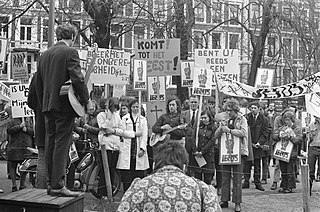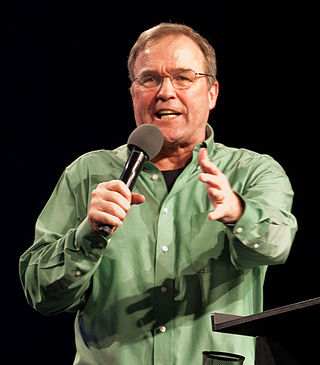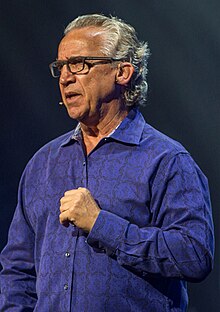Pentecostalism or classical Pentecostalism is a Protestant Charismatic Christian movement that emphasizes direct personal experience of God through baptism with the Holy Spirit. The term Pentecostal is derived from Pentecost, an event that commemorates the descent of the Holy Spirit upon the Apostles and other followers of Jesus Christ while they were in Jerusalem celebrating the Feast of Weeks, as described in the Acts of the Apostles.

The Jesus movement was an evangelical Christian movement that began on the West Coast of the United States in the late 1960s and early 1970s and primarily spread throughout North America, Europe, Central America, Australia and New Zealand, before it subsided in the late 1980s. Members of the movement were called Jesus people or Jesus freaks.
Restorationism, also known as Restitutionism or Christian primitivism, is a religious perspective according to which the early beliefs and practices of the followers of Jesus were either lost or adulterated after his death and required a "restoration". It is a view that often "seeks to correct faults or deficiencies by appealing to the primitive church as normative model".
The Association of Vineyard Churches, also known as the Vineyard Movement, is an international neocharismatic evangelical Christian association of churches.
Nondenominational Christianity consists of churches, and individual Christians, which typically distance themselves from the confessionalism or creedalism of other Christian communities by not formally aligning with a specific Christian denomination. According to Arizona Christian University's Cultural Research Center, nondenominational faith leaders typically maintain a biblical worldview at higher percentages than those of other Christian groups.

Calvary Chapel is an international association of charismatic evangelical churches, with origins in Pentecostalism. It maintains a number of radio stations around the world and operates many local Calvary Chapel Bible College programs.
The charismatic movement in Christianity is a movement within established or mainstream Christian denominations to adopt beliefs and practices of Charismatic Christianity, with an emphasis on baptism with the Holy Spirit, and the use of spiritual gifts (charismata). It has affected most denominations in the United States, and has spread widely across the world.

John Richard Wimber was an American pastor, Christian author and musician. Initially ordained as a Quaker minister, he became an early, pioneering pastor of charismatic congregations, and a popular thought leader in modern Christian publications on the third person of the Christian Trinity, the Holy Spirit, and the Holy Spirit's action in modern churches through miraculous phenomena referred to as miracles, or signs and wonders. Wimber was a founding leader of the Vineyard Movement, a Christian movement that Kenn Gulliksen began in the United States and that later became a wider denomination.
Church planting is a term referring to the process that results in a new local Christian congregation being established. It should be distinguished from church development, where a new service, worship center or fresh expression is created that is integrated into an already established congregation. For a local church to be planted, it must eventually have a separate life of its own and be able to function without its parent body, even if it continues to stay in relationship denominationally or through being part of a network.

The Toronto Blessing, a term coined by British newspapers, refers to the Christian revival and associated phenomena that began in January 1994 at the Toronto Airport Vineyard church (TAV), which was renamed in 1996 to Toronto Airport Christian Fellowship (TACF) and then later in 2010 renamed to Catch the Fire Toronto. It is categorized as a neo-charismatic Evangelical Christian church and is located in Toronto, Ontario, Canada. The revival impacted charismatic Christian culture through an increase in popularity and international reach and intensified criticism and denominational disputes. Criticism primarily centered around disagreements about charismatic doctrine, the Latter Rain Movement, and whether or not the physical manifestations people experienced were in line with biblical doctrine or were actually heretical practices.
Signs and wonders refers to experiences that are perceived to be miraculous as being normative in the modern Christian experience, and is a phrase associated with groups that are a part of modern charismatic movements and Pentecostalism. This phrase is seen multiple times throughout the Bible to describe the activities of the early church, and is historically recorded as continuing, at least in practice, since the time of Christ. The phrase is primarily derived from Old and New Testament references and is now used in the Christian and mainstream press and in scholarly religious discourse to communicate a strong emphasis on recognizing perceived manifestations of the Holy Spirit in the contemporary lives of Christian believers. It also communicates a focus on the expectation that divine action would be experienced in the individual and corporate life of the modern Christian church, and a further insistence that followers actively seek the "gifts of the Spirit".

The Apostolic Church is an international Christian denomination and Pentecostal movement that emerged from the Welsh Revival of 1904–1905. Although the movement began in the United Kingdom, the largest national Apostolic Church became the Apostolic Church Nigeria. The term "Apostolic" refers to the role of apostles in the denomination's church government, as well as a desire to emulate 1st century Christianity in its faith, practices, and government.
The Neo-charismaticmovement is a movement within evangelical Protestant Christianity that is composed of a diverse range of independent churches and organizations that emphasize the current availability of gifts of the Holy Spirit, such as speaking in tongues and faith healing. The Neo-charismatic movement is considered to be the "third wave" of the Charismatic Christian tradition which began with Pentecostalism, and was furthered by the Charismatic movement. As a result of the growth of postdenominational and independent charismatic groups, Neo-charismatics are now believed to be more numerous than the first and second wave categories. As of 2002, some 19,000 denominations or groups, with approximately 295 million individual adherents, were identified as Neo-charismatic.

Michael Leroy Bickle is an American evangelical leader who was the founder of the International House of Prayer (IHOPKC). Once the leader of IHOPKC, Bickle oversaw several ministries and a Bible school. Bickle has written a number of books and served as the pastor of multiple churches.
The New Apostolic Reformation (NAR) is a theological belief and movement that combines elements of Pentecostalism, evangelicalism and the Seven Mountain Mandate to advocate for spiritual warfare to bring about Christian dominion over all aspects of society, and end or weaken the separation of church and state. NAR leaders often call themselves apostles and prophets. Long a fringe movement of the American Christian right, it has been referred to as "one of the most significant and controversial movements in late-twentieth-century evangelicalism." The NAR's prominence and power have increased since the 2016 election of Donald Trump as US president. Theology professor André Gagné, author of a 2024 book on the movement, has characterized it as "inherently political" and said it threatens to "subvert democracy." Many notable American Republican politicians such as Mike Johnson, Doug Mastriano, Marjorie Taylor Greene, and Lauren Boebert and activists such as Charlie Kirk have aligned with it.
The Apostolic-Prophetic movement is a US-based Christian movement founded in the early 2000s. It is a network of non-denominational alliances of independent churches and ministries.
The British New Church Movement (BNCM) is a neocharismatic evangelical Christian movement. Its origin is associated with the Charismatic Movement of the 1960s, although it both predates it and has an agenda that goes beyond it. It was originally known as the "house church movement", although this name is no longer relevant as few congregations meet in houses. Gerald Coates, one of the early leaders, coined the name New Churches as an alternative. It is also restorationist in character, seeking to restore the church to its 1st century equivalent. While the Charismatic Movement focused on the transformation of individuals, the BNCM focused also on the nature of the church. For the BNCM since 1970, this has focused on the renewal of the fivefold ministries, particularly apostles, which for others might resemble a charismatically ordained and functioning episcopate.

Bethel Church is an American non-denominational neo-charismatic megachurch in Redding, California, with over 11,000 members. The church was established in 1952, and is currently led by Bill Johnson. Bethel has its own music labels, Bethel Music and Jesus Culture ministries, which have gained popularity for contemporary worship music. The church runs the Bethel School of Supernatural Ministry with over 2,000 students annually.
Charismatic Christianity is a form of Christianity that emphasizes the work of the Holy Spirit and spiritual gifts as an everyday part of a believer's life. It has a global presence in the Christian community. Practitioners are often called Charismatic Christians or Renewalists. Although there is considerable overlap, Charismatic Christianity is often categorized into three separate groups: Pentecostalism, the Charismatic movement, and the Neo-charismatic movement.
Charles D. (Chuck) Pierce is the founder and current president of Glory of Zion International Ministries. He is most known for his prophecies, including a successful prophecy that Donald Trump would be elected to the US presidency and a failed prophecy that Donald Trump would be reelected in 2020.







